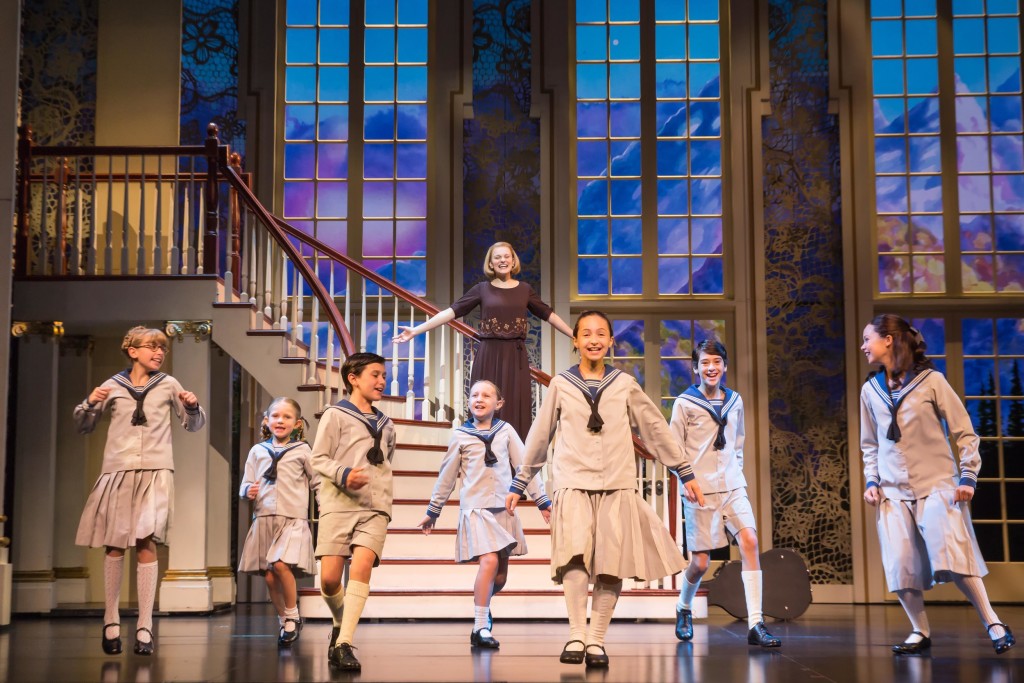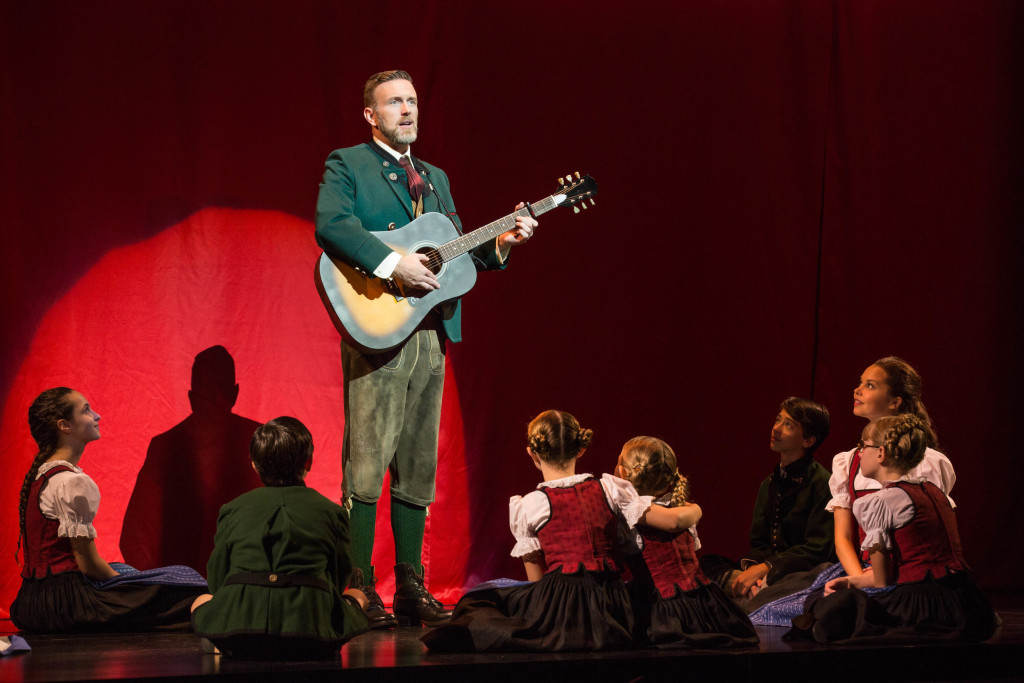
The Sound of Music national tour opened at Broadway San Jose on Election Day, November 8th, 2016. When CNN called Ohio for Trump, audience members were just settling into their seats. By intermission, he had clinched Florida and North Carolina. A few minutes later, cast powerhouses Merwin Foard (Max Detweiler) and Teri Hansen (Elsa Schraeder) crooned, “Compromise, and be wise! / Let them think you’re on your side, be non-committal.” When Ben Davis (Captain von Trapp) insists he’s a proud Austrian who “will not bow [his] head to” the German Nazis in the face of imminent Anschluss, Max insists he “won’t have to bow [his] head to stoop a little.” And just as the von Trapp Family Singers eulogized their homeland in “Edelweiss” as Nazi guards waited in the wings, Trump clinched Pennsylvania.
2016 America is not 1938 Austria. As protests erupted across the country this week, we are reminded that our fundamental right to free speech remains integral to American identity. Trump’s election was not the product of coercive integration with a fascist neighbor; it came from within. And, as has happened since 1797 when Adams assumed the presidency, we expect that in January, President Obama will peacefully transfer power to President-elect Trump, and that the separate branches of government will not converge into a single dictatorial body. But like The Sound of Music’s Austria, we as a nation are in a period of confusion, fear, and mourning.
Often in times of widespread strife or sorrow, I look to people I respect and admire for reassurance or clear-cut guidance. Unsurprisingly, on Wednesday morning, this reassurance —the suggestion that Tuesday night could shape up to be better than the worst nightmare for so many communities in America—was nowhere to be found. In the places I usually search for wise and varying perspective, I found “An American Tragedy,” Michael Moore’s five point plan, and public, living documents about how to prepare for January.
It’s a strange thing to watch history unfold without distance or abstraction.
I almost didn’t go to The Sound of Music because it felt so frivolous in the face of despair I was beginning to wrap my head around. But selfishly, I sought solace in the hope that art exists in conversation with history and can serve as a vehicle for understanding our lives. Because if it doesn’t—if instead it doesn’t matter at all—I’m not sure how to grapple with the crushing reality and future responsibility.
The strengths of this production, especially its cast, provided relatability and comfort amidst confusion. The Sound of Music’s success is reliant on the seven von Trapp children, whose range in age and personality create a powerful lens for the show. Iris Davies (Brigitta) stood out as perceptive and honest, while Paige Silvester played Liesl with authenticity to her age and exuberant sass. While she is the only one depicted with interests outside the family, she also becomes an integral component to her family’s survival. Silvester adeptly shows Liesl’s maturation, especially in response to the world around her. The other children show another dimension of childhood response to political uncertainty—they are the ones who do not fully understand, who ask why the von Trapps must hang the ugly swastika flag outside their home, who know that the adults’ dismissal of their questions is short of satisfactory, but don’t know exactly why. Just like the dejected kindergartners in my friend’s classroom who ask why we have a “mean” president, because their only descriptors are “mean” and “nice,” the von Trapp children struggle to find the words to describe their world. We need these talented actors to understand the range of responses and effects that both familial and political turmoil have on our children.

As we watch the von Trapp children try to understand their home, in spite of the adults’ dismissal of their questions, we’re forced to pause and consider whom to hold responsible for the horror beginning to unfold in Austria: “One thing is for sure: nothing you can do will make any difference.” With those words, the ever-obsequious Max spurs a debate that arises in every traumatic historical moment: who is responsible? Who is at fault? And are those two ideas—responsibility and blameworthiness—the same? Though he isn’t asking those questions directly, his insistence that he is not just blameless but in fact incapable of inciting change forces us to consider who is capable, and whether the capacity makes them responsible. The Sound of Music conveys and questions culpability on three levels: The von Trapp family, Max (a von Trapp family friend), and Rolf (the seventeen-going-on-eighteen telegram messenger turned Austrian Nazi). Through these three examples, the show asks us to consider if anything short of true resistance and an effort to spread that resistance to one’s community, a grueling task in which none of the characters participate, is complicit behavior.
Ultimately, The Sound of Music suggests that without the benefit of hindsight—which an audience has and cannot disregard in its judgements—complicity is not a binary. While Rolf joins Nazi forces, he’s a young boy from a family with few resources, likely unaware of the widespread implications of his behavior. Is he guilty when he joins? Later, when Captain von Trapp flees on the eve of his mandated German military service, Rolf participates in the search to find the captain and his missing family. Is he guilty then? And, in what most audience members would label his moment of goodness, the split second in which he finds the von Trapps in the church garden and chooses to protect them, he acts out of love for Liesl, the eldest daughter, and not an obligation to be a protector of good.
Max is older and more informed than Rolf, and his decision to cozy-up to the Germans is a calculated one. In fact, he tells Captain von Trapp in blatant terms that when the Germans come, it’s better to have friends than enemies, rightness aside. Though he doesn’t join Nazi forces, he expends time and resources ensuring that powerful people know he’s not a threat to the Third Reich. Does the intentionality of his choices equate to guilt? Like Rolf, Max ultimately chooses to protect the von Trapp family. But like Rolf, his protection emerges from his affection for the family. In other words, there’s no indication that he would protect a family he didn’t love.
So, are the von Trapps — who refuse to join the ranks of evil but instead flee their homeland — the good ones? Captain von Trapp’s opposition to the German army is borne more out of a love for country, and a resentment of the insistence that Austrians and Germans are one and the same, than of moral qualms about events that might transpire during the war years to come. Perhaps because the von Trapps are portrayed as thinking and well-meaning characters it’s easy to assign their actions of resistance additional value, but ultimately, they too act out of self-preservation.
It’s hard to cast a clear picture of responsibility and guilt in The Sound of Music, a theatrical telling of history that allows for backstory and complexity in a way real life rarely does. But maybe some of the ways in which I conceive of responsibility in this show can aid my understanding of responsibility in this election. While some voters acted out of hatred and evil—a belief that their lives were more valuable than the lives of others and the safety of all—others acted out of desperation or on misinformation. However, in an age when knowledge about the tragedies of the past is so readily available—an age where we still do not have the benefit of hindsight, but certainly have enough information to draw historical parallels and tools to learn about our own country’s past—it’s challenging to muster empathy and understanding for millions of voters at whom I’m so angry, even with the simultaneous understanding that in many cases, I don’t understand their lives at all. It’s one thing to believe in a candidate’s platform, another to disregard hateful, violent language and vote in a state of cognitive dissonance. Yes, it’s inexcusable and devastating to elect a xenophobic, racist, sexual-assaulter to the presidency, but there are certainly ways in which my current inclination to dismiss millions of people out of anger and with harsh judgement contributed to this mess in the first place.
There are rare moments in theater when you can feel an audience snap together into a mutual understanding of an experience. Sometimes that moment looks like a delayed burst of laughter or a sigh of relief. On occasion, those moments come in silence—in thinking. The audience this Wednesday was eager for one of those instances—for a moment of collective extrapolation that could aid us in understanding our country. Some reassurance that 1938 Austria won’t resemble 2017 America. Perhaps because I walked into the theater miserable and distracted, I was skeptical that such a moment could arise. So when it did, during an acoustic rendition of “Edelweiss” with a backdrop of four, 50-foot Nazi flags hanging from the ceiling, it felt oddly relieving.

In the von Trapp Family Singers’ Kaltzberg Festival performance of “Edelweiss” just before they attempt escape, Captain von Trapp sings the first verse alone. It is a verse so well known it’s often mistaken for the tune of Austria’s national anthem. So when Captain von Trapp looked up at the Nazi flags and caught his breath instead of singing “bless my homeland forever,” the omission was painful and sharp. In giving Austria his benediction, Captain von Trapp is saying goodbye. Together, the audience ached.
In that moment during “Edelweiss” in the theater, I was pummeled by the audience’s reaction, and my consequential understanding that, as saccharine as it may sound, this is my homeland. A place in which, by sheer luck-of-the-draw, I’ve been granted every opportunity. A place in which I, as Aaron Sorkin wrote, am “fairly insulated from the effects of a Trump presidency.” A place in which, even as a rabid consumer of news and information both about this election and otherwise, I have an immense amount to learn and understand and help to mend by listening to so many who are far less insulated than myself.
There are so many who feel American, but neither loved nor respected by America. So many who do not feel safe in their homeland. So many who, perhaps correctly, feel that America is a land of division and immobility—a nation built by slaves and immigrants for the expansion of a white, wealthy, exclusionary ideal.
The von Trapp’s Austria posed a threat so divisive that Captain von Trapp uses “Edelweiss” as a farewell blessing for the country he loves. If we hope to live in an America that upholds the rights and ideals that defined its founding (in theory, if not in practice), instead of following through with Canadian immigration jokes and #Calexit, it is our responsibility to bless our home with strong voices and stronger actions. Praying for a country too often dismissive of its own history to “bloom and grow forever” is simply insufficient.
Images courtesy of Matthew Murphy
